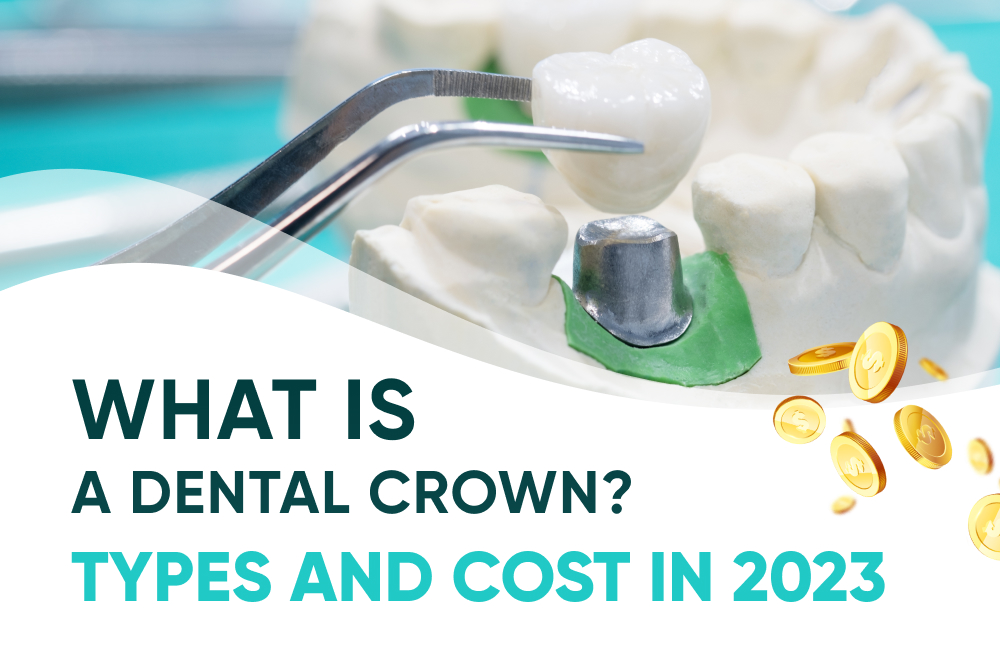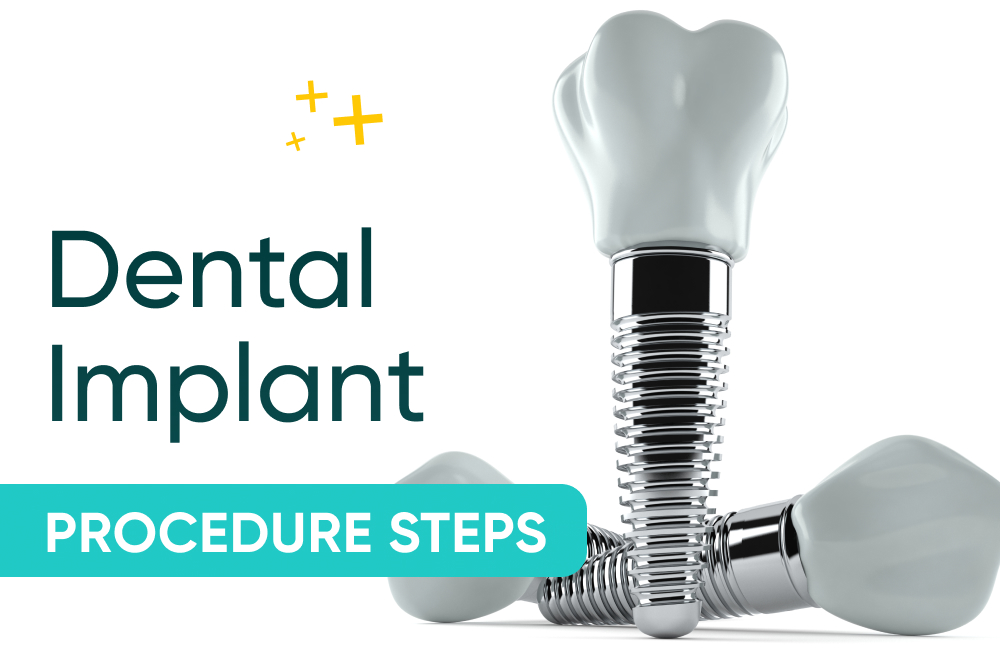A tooth crown, known as a cap, is a type of dental restoration that completely covers the visible part of a tooth restoring your tooth strength, size, shape, or appearance.
Crowns for teeth are indicated for badly decaying, broken, or otherwise damaged teeth, and they can help to maintain and support the remaining tooth structure. Tooth crowns can be made from Porcelain, Resin, Metals, and Porcelain-Fused-to-Metal.
Types of a Tooth Crown
There are several types of dental crowns your dentist can offer, including:
Gold or other metal alloys: tooth crowns can be made from different metals. They can be made from base metal alloys or with a high gold or platinum content. Tooth crown is strong and resistant to chipping and cracking, making them the most long-lasting type of crown.
Unfortunately, they are highly noticeable and stick out among your natural teeth. This makes metal crowns ideal for molars in the back of your mouth, but if you’re concerned about people catching a peek of metal, you’ll be pleased with a more natural-looking material.
All-porcelain or all-ceramic crowns: these crowns are often used on front teeth and are made of ceramic or porcelain. They are color-matched to your teeth and are perfect for those allergic to metal. Ceramic crowns are also beneficial to individuals who are concerned about the sight of metal in their mouths.
Porcelain-fused-to-metal (PFM) crowns: are made of a metal frame covered with porcelain. They are strong, long-lasting, and can be colored to match your natural teeth. PFM crowns are commonly used on back teeth because they can resist the pressures of chewing and grinding.
Metals provide strength, there are drawbacks; after a short time, the metal becomes evident as a dark line at your gum line.
Resin crowns: These crowns are made of plastic and are custom-molded to fit your tooth. They are less expensive than other types of crowns, they are less strong or as long-lasting. They are also less aesthetically pleasing than other forms of crowns.
What Is Involved in the Tooth Crown Procedure?
The process will be determined by whether your dentist chooses a multi-day or same-day procedure.
1) Dental Crown with Multiple Visits
• The crown-required tooth is examined and prepared by the dentist. X-rays of the tooth may be required, proper anesthesia will be applied.
• Your dentist will partially remove the outer layer of your tooth and take an impression of the tooth and its surroundings. Some dentists do the impression digitally and others can do it manually.
• Sometimes, temporary crown will be placed over your tooth by the dentist. Then your dentist will send the impression to a laboratory to fabricate the crown. This procedure may take many weeks.
• After a few weeks, when your permanent crown has arrived, you’ll return for a second visit. So Your dentist may numb the tooth again, remove the temporary crown, and cement the permanent crown. Finally, your dentist will examine your bite once more and adjust the crown.
• If the crown causes discomfort in the following days, you may need to return for a third visit to make a few more modifications.
2) Same-day Dental Crown
You can say goodbye to temporary crowns and the time-consuming process of getting a dental crown. Your dentist will take digital photographs of your mouth, use state-of-the-art technology to create a customized crown in the office, and then cement it within 3-4 hours.
Why Do You Need a Dental Crown?
Crowns for teeth are used to treat many dental problems. Tooth crown can be used for cosmetic treatments, like covering severely crooked or stained teeth, or for functional purposes, such as protecting weak teeth that have undergone root canals. Tooth crown can also be used to support a tooth with a large filling or to cover baby teeth that are susceptible to heavy decay.
What’s the Difference Between a Permanent and Temporary Crown?
A temporary dental crown is less expensive and less long-lasting materials. They are made of less durable materials, such as acrylic. They are intended to be worn for a limited period (about 2-4 weeks) until a permanent crown can be created and placed.
Temporary crowns are sometimes used to safeguard baby teeth that have been damaged or are at risk of decay. Temporary crowns aren’t meant to last, but permanent crowns are.
How Much Does a Crown Cost in 2022?
Average cost of dental crown 2022 is around $1,200 to $1,800. All metal crowns are usually more expensive than PFM crowns, and the average cost of this type of crown is around $1,500 to $2,500. All porcelain or ceramic crown may cost between $800 and $3,000. A full gold crown may cost $600 to $2,500, and a resin-based composite crown in 2022 is around $800 to $1,500 or even more.
It’s important to note that these estimates are approximate, and the cost of a dental crown can vary widely depending on the specific circumstances like your location. Dental insurance plans usually cover a portion of the cost of a crown, and many dental practices offer financing options to help make the cost more manageable.
FAQ
Here are some of the most frequently asked questions regarding dental crowns.
Q: Is eating or drinking safe after a dental crown?
A: It is advised to avoid hard, sticky, or chewy foods for 24 hours after placing your dental crown to allow the tooth and crown to settle correctly. Also, avoid hot or cold foods and drinks for the first 48 hours to avoid sensitivity problem.
Q: Is it painful to have a dental crown?
A: The dental crown process is usually not painful. You may feel moderate discomfort. Your dentist will numb the region around the tooth treated with a local anesthetic, so you should feel little to no pain during the operation. You may notice slight sensitivity or discomfort following the treatment, this should disappear within a few days.
Q: Can I get a dental crown while wearing braces?
A: Getting a dental crown while receiving orthodontic treatment depends on your current situation and how far along you are in the treatment process. Sometimes, you may need to wait until you complete your braces treatment before receiving a crown. The crown must be created and fitted on a tooth in its final position. The crown may not fit properly if your teeth are still moving due to the braces. In some situations, the orthodontist and dentist can work together to develop a solution that let you to receive the crown while wearing braces.
Q: How long do dental crowns last?
A: The lifespan of a dental crown is determined by different factors, such as the material used to make it. Regardless of the type of crown you have, you have an important part in determining the crown’s longevity. Proper oral care, including regular brushing and flossing, frequent dental check-ups, and avoiding habits that can harm the crown, such as biting on complex objects or grinding your teeth, help extending the crown’s life.
Crowns for teeth can last between five and fifteen years on average, and they can survive even longer with good maintenance. It is important to realize that all dental restorations will eventually need to be replaced. Regular dental check-ups will help you identify when to replace your crown.
Conclusion
Dental crowns are a common and effective way to restore damaged teeth and protect them from further damage. Tooth crown can be made from many materials, each with advantages and disadvantages. It’s important to ask your dentist to determine the best type of crown for your specific needs and budget. With the proper care and maintenance, a dental crown can last many years, giving you a beautiful and confident smile.




